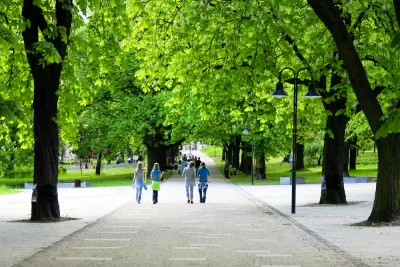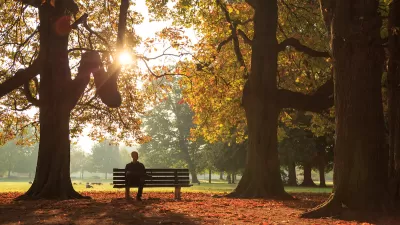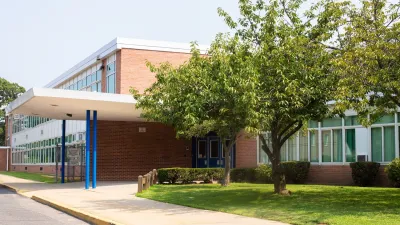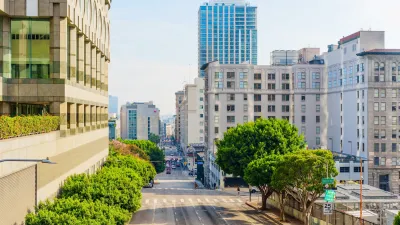More and more evidence has emerged in recent years about the many benefits of trees in urban environments. Every now and then, however, a study finds evidence that tress might not always be as benevolent as they seem.

Rob MacKenzie shares insight into new research that might complicate assumptions about the role of trees in urban environments. The problem, writes MacKenzie: "some recent studies have suggested that trees may in fact worsen urban air quality by trapping pollutants at street level."
It's not that simple, of course, and Mackenzie insists that a closer look at the evidence "can help us come to a more nuanced understanding of the impacts of trees on our urban environment."
It all has to do with effect of the cocktail of buildings, structures, and landscapes that make up the city, of which trees have a unique role to play. "Trees affect the urban environment in several subtle ways. From altering air flows, to collecting pollution deposits, to affecting the chemical make up of the atmosphere, their impacts are both pervasive and difficult to pinpoint," writes MacKenzie.
So while MacKenzie goes into more detail about the several different pollution processes tress take part in, no studies have so far managed to put all the pieces of a city together. In lieu of a comprehensive model, MacKenzie uses the article as an opportunity to suggest strategies for piecing together different studies to create a more complete picture.
For more on the complex questions posed by the role of trees in the urban environment, an earlier article by John Gallagher first raised some of the same discussion points.
FULL STORY: Do trees really help clear the air in our cities?

Montreal Mall to Become 6,000 Housing Units
Place Versailles will be transformed into a mixed-use complex over the next 25 years.

Planetizen Federal Action Tracker
A weekly monitor of how Trump’s orders and actions are impacting planners and planning in America.

DARTSpace Platform Streamlines Dallas TOD Application Process
The Dallas transit agency hopes a shorter permitting timeline will boost transit-oriented development around rail stations.

Without International Immigrants, the Rural US Population Would Be Falling 58%
Census data shows that population growth in rural areas is due in large part to international migrants.

Dead End: Nine Highways Ready for Retirement
The Freeways Without Futures report describes the nation’s most promising highway removal proposals.

Congressman Proposes Bill to Rename DC Metro “Trump Train”
The Make Autorail Great Again Act would withhold federal funding to the system until the Washington Metropolitan Area Transit Authority (WMATA), rebrands as the Washington Metropolitan Authority for Greater Access (WMAGA).
Urban Design for Planners 1: Software Tools
This six-course series explores essential urban design concepts using open source software and equips planners with the tools they need to participate fully in the urban design process.
Planning for Universal Design
Learn the tools for implementing Universal Design in planning regulations.
City of Mt Shasta
City of Camden Redevelopment Agency
City of Astoria
Transportation Research & Education Center (TREC) at Portland State University
City of Camden Redevelopment Agency
Municipality of Princeton (NJ)
Regional Transportation Commission of Southern Nevada





























